
All Power to the Ideals!
08.02.17
What kind of centenary celebration, Mark Perryman asks, does 1917 deserve?
 A century ago, 23rd February 1917, Russian women marched out in protest from the St Petersburg factories where they worked to defy Cossacks armed with swords and took control of the city’s streets. In less than a week they had been joined by hundreds of thousands of other workers.The St Petersburg Military Garrison mutinied in their support. A rebellion led by women for people’s power had begun.
A century ago, 23rd February 1917, Russian women marched out in protest from the St Petersburg factories where they worked to defy Cossacks armed with swords and took control of the city’s streets. In less than a week they had been joined by hundreds of thousands of other workers.The St Petersburg Military Garrison mutinied in their support. A rebellion led by women for people’s power had begun.
The 1917 centenary will be one of the publishing events of the year with writers from Left and Right battling it out in words over the legacy. The Royal Academy, the Design Museum, British Library and Tate Modern will all host major exhibitions of Revolutionary-era art. In October Philosophy Football, in association with the RMT, will present a night out at London’s Rich Mix Arts Centre ‘To Shake the World’ celebrating the culture of the Revolution. While during the day Michael Rosen and friends will host an event for families featuring the children’s books of the revolution. And there will even be a guided history walk to visit the hidden history of connections between London’s East End and 1917.
Not all agree that 1917 deserves any kind of celebration at all. Art critic Jonathan Jones writing in the Guardian rages against the spectacle of the Royal Academy ‘Revolution : Russian Art 1917-1932’ exhibition because “The way we glibly admire Russian art from the age of Lenin sentimentalises one of the most murderous chapters in human history.” Unless the Royal Academy (the clue might be in the title Jonathan) has reinvented itself as a bastion of Marxism-Leninism it is most unlikely they will be sentimentalising communism nor, given their reputation, is glibness likely to characterise how they showcase the art via context.
It is undeniable that the Russian Revolution cost lives, millions of lives. It took place in the era of World War One when millions of lives were being lost on the fields of France too. And this was the age of Empire with millions more lives sacrificed in the cause of imperial plunder and subjugation across the world. All three events, 1917, WWI, Empire were bloody. None should be sentimentalised. Each needs to be understood. Anything else is the denial of history.
In ’89 the fall of the Berlin Wall was famously claimed to mark ‘the end of history’. Yet a generation later the cause of radical change in an era of #dumptrump and #chaoticbrexit remains.The strength of the connections between these 2017 social movements and 1917 are there to be argued over, the history contested but to dismiss the revolution of a century ago as either wholly irrelevant or entirely the model for change? Either would be both arrogant and unwise.
The crucial point of the October Revolution was reached some seven months after those women workers first marched when the Russian Royal Family’s Winter Palace was successfully stormed. The signal for the assault to begin was the firing of a blank from the bow gun of the Russian warship, Aurora. The ship’s crew, inspired by the protesting women had mutinied back in February to side with the Bolsheviks.
And what followed 1917 was a movement, in Russia, but beyond too, that unleashed the most unprecedented wave of creative imagination. Today the art of the period has become chic, fit to hang on the most respected gallery walls,treated as an historic artefact not a tool of revolutionary change. Of course nobody would decry the simplistic beauty of Lissitzky’s Red Wedge but to disconnct the aesthetic of this and hundreds, thousands, of other pieces from a period when art, poetry, music, film, theatre and more from the ideas that propelled them into production with a revolutionary impulse would be a travesty. Perhaps the most famous cultural movement out of 1917 was contructivism. But these weren’t shapes artfully assembled without purpose. This was construction with designs on everlasting change, revolution. Too often this is represented, and reproduced too by those who fail to learn the lessons of 1917’s failings, as a top down didactic. Rather at its best, politically and artistically the Russian Revolution was a movement from below inspired by the human capacity to shake the world in which we live.
This is the point those who decry the 1917 Celebrations miss and some who join with the commemorations miss it too. This wasn’t a revolution made by Lenin, Trotsky, or Stalin. Though all three played their part of course in what it was, and what it became. But most of all this was a revolution made by ordinary people, women factory workers began it, rank and file sailors fired the starting signal, with their actions and achievements they inspired a vision for a better world. This is what we should celebrate 1917 for, the potential that we the people have, together, to effect change.
Philosophy Football’s 1917 Centenary range of T-shirts is available here
Further reading
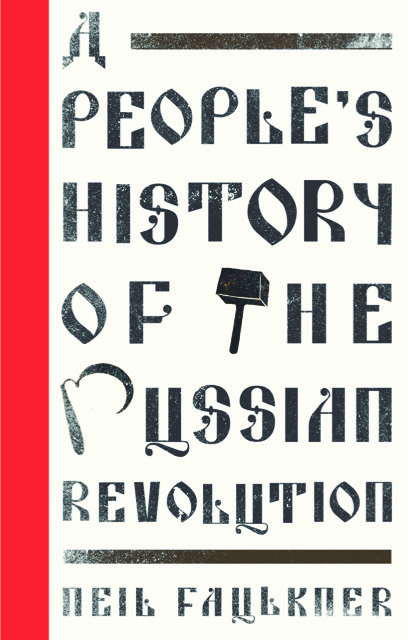 Neil Faulkner, A People’s History of the Russian Revolution is available from here
Neil Faulkner, A People’s History of the Russian Revolution is available from here
Mark Perryman is the co-founder of the self-styled ‘ sporting outfitters of intellectual distinction’ aka Philosophy Football
Heroes, and some Villains
17.01.2016
Sanjiv Sachdev reviews ‘Exhibit A’ by Hugh Tisdale and Dan Murrell
‘Fame, puts you where things are hollow’ -David Bowie
Celebrity masks of the likes of Simon Cowell, Princess Diana and Robbie Williams, are a familiar sight in tourist sites and seaside resorts. ‘Exhibit A’, a new show by Hugh Tisdale and Dan Murrell, converts this commonplace tourist trinket to witty, subversive and sometimes disturbing effect.
A rich seam of political caricature runs through British art; from Hogarth, James Gillray and Thomas Rowlandson to modern day equivalents of Peter Kennard, Martin Rowson and Steve Bell, the wealthy, privileged and powerful are interrogated, savaged, scrutinised. ‘Exhibit A’ stands in this tradition. The legacy of John Heartfield’s coruscating photomontages, that foretell and depict the savagery of the Third Reich, is also evident. There are also echoes of that notorious inquisitor of fame, Warhol, the presence of Mao and Monroe inevitably invite comparisons. Fame, benign or malign, is weighed and questioned. In an era where fame is no longer seen as a by-product of achievement, although it still often remains that, but a pre-eminent value in its own right, these questions are worth posing.
Masks have a long history in culture and art, enabling the concealment of individual identity and the assertion of others. Greek theatre masks enabled transformation into an array of roles, be it satyr or god, young or old, man or woman; Venetian masks were a subversive response to one of the most rigid class hierarchies in European history; African masks hugely influenced Picasso’s revolutionary ‘Les Demoiselles d’Avignon’; ‘V for Vendetta’ Guy Fawkes masks were a ubiquitous feature of the Occupy era. Today’s Facebook age has social media ‘masks’ that portray cheery pictures of full lives of contentment and achievement concealing mishaps, setbacks or flaws.
Fifty mask images, of mostly twentieth century figures, line the gallery walls. Appearances are deceptive – what initially appear to be photos, actually use a range of techniques including intricate drawing, crayon, watercolour as well as deft photo-shopping. Some are black and white, others in colour. The punched out eyes, varying in size and character, of the masks inherently produce a dead eyed, glassy glare, removing human warmth with blankness. Despite this, some of the pictures retain a benign aspect – including Orwell - sans eyes, Big Brother isn’t watching you? - the Dalai Lama, Stalin, in ‘Uncle Joe’ mode rather than that of murderous despot – the cult of personality as variant of the cult of celebrity, and an avuncular Nixon, a mask of whom was used in a bank heist scene in the film ‘Point Break’. Without eyes, Pele and Frank Zappa take on a decidedly belligerent air. Marie Curie appears to (aptly) assume X-ray eyes.
Some themes are apparent. There are several images of Artists as Art. Duchamp, one of these, would surely approve; sometimes using the techniques associated with that Artist, such as watercolour for Hockney. Damien Hirst, has ‘PRODUCT’ scrawled graffiti-style on his face and his lips appear sewn together, a critique of one whose artistic integrity is corrupted by mammon. The cold, menacing image of Myra Hindley seems to allude to Marcus Harvey’s infamous portrait. Musicians are a prominent presence. The biro-blue of William Burrough’s picture reflects Burrough’s shambolic writing method. Many of the pictures are of iconoclasts who are now icons - Wilde, Malcolm X, Dylan, Picasso, Simone.
Several juxtapositions are striking. A coarse, Super-8-textured image of JFK, with an extra bullet hole added, is near a black and white one of the last images of Lee Harvey Oswald, shortly to be assassinated himself. Nixon smiles near the terrified face of a Vietnamese child. A saccharine, almost kitsch, Christ stands close to Lennon, bringing to mind that latter’s then controversial remark that “We’re [the Beatles] more popular than Jesus”. Some iconic fictional figures are present – the pared down Clockwork Orange is especially effective and memorable.
One of the most disturbing images is that of Jimmy Saville, whose ghoulish black and white face, redolent of an almost fairy tale evil, wears rose-tinted glasses to chilling effect. Another horrific image is that of 2nd Lieutenant Henry Lumley, whose grievous first world war wounds still shock and appal.
The exhibition is one of unsettling art for unsettling times. Trump, in all his orange, poisoned open-mouthed glory, is, with grim inevitability, one of the 50, and was selected before his shock victory. With its thoughtful blend of reflection, comment and protest the show merits a wide audience.
Exhibit A is at Rich MIx, Shoreditch, London until 29 January, exhbitin details and times here
After the eating and drinking, the sporty?
27.12.16
A selection of 2017 sporting reads by Mark Perryman for the post-festive recovery period
There’s nothing like Christmas to put on an inch or two where we don’t want to. Sitting in front of the TV for hours, days even, on end doesn’t help much either. For many, a New Years resolution to add more physical activity to the weekly routine of eat, sleep, work, repeat is the self-imposed antidote. So what better time to recommend a sporting title to the 2017 must-read list?
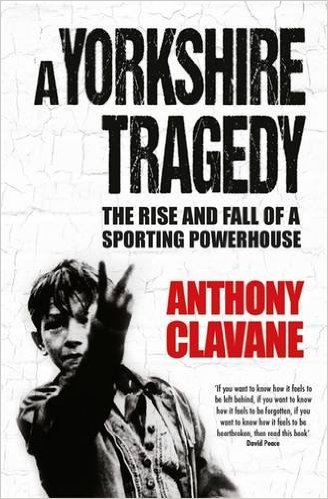 Anthony Clavane’s A Yorkshire Tragedy is the best possible starting point for such an endeavour combining as it does social history and an insight into why both participants and spectators put themselves though the trials and tribulations of winning and losing. And no you don’t have to be from God’s own county to side with the author’s appreciation of Yorkshire grit either. Or for an alternative explanation of the special appeal of sport try Sports Geek by Rob Minto which in words, statistics and pictures explains what it is about sport that will provoke endless arguments in the coming year.
Anthony Clavane’s A Yorkshire Tragedy is the best possible starting point for such an endeavour combining as it does social history and an insight into why both participants and spectators put themselves though the trials and tribulations of winning and losing. And no you don’t have to be from God’s own county to side with the author’s appreciation of Yorkshire grit either. Or for an alternative explanation of the special appeal of sport try Sports Geek by Rob Minto which in words, statistics and pictures explains what it is about sport that will provoke endless arguments in the coming year.
No sport comes close to football in the breadth and ferocity of such arguments it provokes. For everyone who loves a club there’ll be others who loath it. Europe’s ‘super clubs’ provide such emotional splits in abundance, Uli Hesse’s Bayern : Creating a Global Superclub provides the story of one such club known throughout the Bundesliga as 'FC Hollywood' for the non-German reader. Or for unpicking what it is about Argentine football that appeals and appals in almost equal measure read Angels with Dirty Faces by Jonathan Wilson, one of those writers who writes about the familiar in the most unfamiliar of ways. Every now and then an individual player comes along who transcends almost all loyalties to inspire universal interest and irresistible admiration. Johan Cruyff was undoubtedly one such player and his posthumously published autobiography My Turn helps us to understand why. Cruyff passed away in 2016, another kind of passing away that was no less emotional than the loss of a footballing great was West Ham’s move from their beloved ground to the super stadium built for the 2012 London Olympics. A move chronicled with sensitivity and sensibility in Pete May’s Goodbye to Boleyn. It was a move that provoked much controversy in terms of public subsidy, sporting legacy, access, community and more. The Routledge Handbook of Football Studies is testament to the necessity of recognising this kind of context in which the game is played and watched and as such is surely destined to become the definitive academic text on the subject. A more lyrical approach to football’s qualities is provided by Norwegian author Karl Ove Knausgaard in his elegantly written Home and Away. For the dark side of world football there’s no better source of understanding the going wrongs at FIFA than the peerless John Sugden and Alan Tomlinson, Football, Corruption and Lies revisits their earlier writing on this subject. A read and argument that not only has served the test of time but has been proved absolutely right too. .
Football at its best however means we can always dream of something better. Duncan Alexander’s Opta Joe’s Football Yearbook will become I’m sure an annual classic to distinguish the fantasy of football’s dreamers from the statistical reality. But then we will always have the fairtyale of Leicester 2015-16 , retold brilliantly by Rob Tanner in 5000-1.
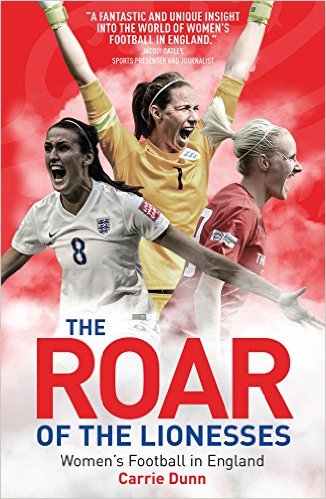 The international stage for England at any rate has been more horror than fantasy pretty much since World Cup 2010 onwards. Steve Mingle provides a reminder of happier, more successful times in When England Ruled the World At least in 2017 there are no tournaments for England to make an early exit from. In contrast Don’t Take Me Home by Bryn Law is the story of semi-finalists’ Wales successful run at Euro 2016 through the tales of the team’s huge and boisterous travelling support. England’s men’s women meanwhile have Euro 2017 to look forward to and as World Cup semi-finalists this century, 2015, unlike their male counterparts ,who haven’t made it that far in any tournament since 1996, they remain serious contenders. Carrie Dunn’s Roar of the Lionesses is the unrivalled account of the rise, and rise, of an England women’s football team to the top of their game.
The international stage for England at any rate has been more horror than fantasy pretty much since World Cup 2010 onwards. Steve Mingle provides a reminder of happier, more successful times in When England Ruled the World At least in 2017 there are no tournaments for England to make an early exit from. In contrast Don’t Take Me Home by Bryn Law is the story of semi-finalists’ Wales successful run at Euro 2016 through the tales of the team’s huge and boisterous travelling support. England’s men’s women meanwhile have Euro 2017 to look forward to and as World Cup semi-finalists this century, 2015, unlike their male counterparts ,who haven’t made it that far in any tournament since 1996, they remain serious contenders. Carrie Dunn’s Roar of the Lionesses is the unrivalled account of the rise, and rise, of an England women’s football team to the top of their game.
Following football however cannot be reduced to World Cups, Euros, the Champions and rich runners up League, your Chelseas, Uniteds and Cities. Need a 2017 football New Year’s Resolution? Why not try a game in a city you’ve never visited at a club you don’t know?
 For those with such internationalist ambitions Stuart Fuller’s The Football Tourist, his second volume of such epic travelling tales, is the very necessary handbook for overseas trip ideas and inspiration. If the domestic gam is likely to suffuie in providing 2017 reinvigoration of a love of football the photography and accompanying text in Beyond the Turnstiles by Leon Gladwell is just the kind of cure required. Many of Leon’s photos feature the non-league game, a portion of the game of increasing appeal to the disillusioned and no better book has ever explained the reasons why than Nige Tassell’s The Bottom Corner. Fed up with football as a day trippers’ day out, never off the TV, players on the front pages for all the wrong reasons, the riches and greed. Despite Leicester none of this will be getting any better in 2017. Read Nige’s book, if not already a fan, give one of the clubs he visited a try out, my own Lewes FC gets a tasty mention, and ensure yourself a happier new year.
For those with such internationalist ambitions Stuart Fuller’s The Football Tourist, his second volume of such epic travelling tales, is the very necessary handbook for overseas trip ideas and inspiration. If the domestic gam is likely to suffuie in providing 2017 reinvigoration of a love of football the photography and accompanying text in Beyond the Turnstiles by Leon Gladwell is just the kind of cure required. Many of Leon’s photos feature the non-league game, a portion of the game of increasing appeal to the disillusioned and no better book has ever explained the reasons why than Nige Tassell’s The Bottom Corner. Fed up with football as a day trippers’ day out, never off the TV, players on the front pages for all the wrong reasons, the riches and greed. Despite Leicester none of this will be getting any better in 2017. Read Nige’s book, if not already a fan, give one of the clubs he visited a try out, my own Lewes FC gets a tasty mention, and ensure yourself a happier new year.
The basic appeal of football, or any other sport is the fulfilment of impossible dreams. Few will ever come close to Jo Pavey’s story in that regard. An elite athlete for her entire adult life and a big chunk of her adolescence too Jo won her first ever Gold Medal at the age of 40, This Mum Runs is her story. For most of us though running is more about just getting round, perhaps a Pb, and a prized finishers’ medal too. This is what continues to make running races such mass participation events which for many have little or no connection to the competitive. Don’t Stop Me Now by Vassos Alexander provides story after compelling story from every level of athletic prowess to reveal the enduring attraction and challenge of completing a 26.2 mile marathon with or without time to spare.
The GB 1980s jogging boom has a lot of parallels with the cycling revolution of the past five years or more. Elite Olympian success, easy to access sport, mainly recreational but with mass participation events for those who prefer a competitive edge yet even these are relatively unstructured and informal. The fashion designer Paul Smith’s Cycling Scrapbook is a beautifully produced account of the visual culture of cycling that has proved seductive enough for men who really should know better to kit themselves out in lycra. Magnum Cycling with text by Guy Andrews has an array of, mainly archive, photography that will persuade almost anyone that road cycling is simply the most photogenic of all sports, bar none. Camille J McMillan’s Circus does a similar job with modern day cycling, the incredible sight of Le Tour on the road as engaging as it has ever been. A key part of the look is of course what the riders wear , The Art of the Jersey by Andy Storey provides a richly well-informed history of this most essential, and colourful, piece of any cyclist’s kit. Apart from that it’s all about the bike, or in Lance Armstrong’s case who made the phrase his own it turned out it wasn’t. Lined up on the road in the peloton, breakaways, bunch sprint finishes and the rest it can all get hellishly complicated to follow. Fortunately ITV4 have recruited one of the finest double acts of sports reporter and former star in any televising of a sport, Chris Boardman and Ned Boulting. They both have new books out which explain their appeal as presenters and why they work so well together on air. Triumphs and Turbulence is Chris’s autobiography from Olympic success in ‘92 to businessman and broadcaster today. Ned’ s Vélosaurus helps the reader to understand the universally French language of Le Cycling with wit and insight, s’il vous plait. But of course with cycling watching is not even half the story, it is what we can do that really counts. What other sport can be a means of getting to work, carrying the shopping home, excuse for a day out with the kids or holiday even. The binary divide of recreation vs competition demolished. Though we’d all like to cycle uphill minus the puff mind. Never mind buying an electric bike as the solution RideStrong by Jo McRae is a handbook of do-it-at-home exercises to condition our bodies for faster and longer rides in 2017.
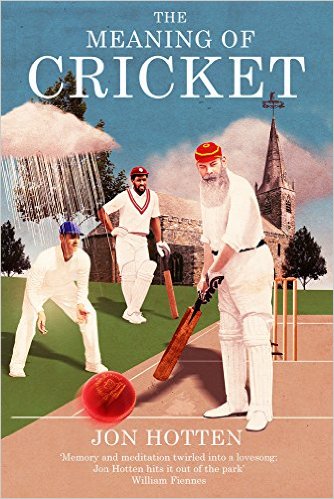 Next year will close with an ‘away’ Ashes series in Australia with most of England’s test cricket between now and then seen as a build up to this most serious of grudge matches. Jon Hotten’s The Meaning of Cricket is the perfect companion volume to explain why the long wait will be more than worth it.
Next year will close with an ‘away’ Ashes series in Australia with most of England’s test cricket between now and then seen as a build up to this most serious of grudge matches. Jon Hotten’s The Meaning of Cricket is the perfect companion volume to explain why the long wait will be more than worth it.
In terms of GB sporting success in 2016 nothing came very much close to the Gold, Silver and Bronze haul at the Rio Olympics and an historic third place in the Medal Table, helped it has to be said though by the justifiable yet significant absence of most of the Russian team. The Impact of the 2012 Olympic and Paralympic Games edited by Kevin Dixon and Tom Gibbons details the significance, or otherwise, of such Olympian success by looking back to the previous, ‘home’ Games and their meaning today. Then before you know it the 2018 Winter Games will be upon us and then Tokyo 2020. The Olympic Cycle is never-ending, hardly giving any space for reflection and critical analysis. Providing plenty of the latter and helping perhaps to prevent all the excitement over the success of Rio’s Team GB obscuring 2017’s sinking levels of sports participation Understanding the Olympics by John Horne and Garry Whannel provides a good read for those whom the next sporting year will include a fond looking back to Rio while wondering hat all those medals won will mean for the rest of us in 2017. .
But it isn’t just the quadrennial Olympics that should ignite the need to engage with the collision between the sporting and the political. The Routledge Handbook of Sport and Politics is broad-ranging, comprehensive and incisive in its cataloguing of how this mix happens and shapes so much of life beyond the arena.
 Beyod all these good, but serious, reads my New Year treats will include a strip-cartoon, a spot of colouring in, a novel and the first of a splendid new seris of sports books for children. The Illustrated History of Football by David Squires is a comic-book style approach to where our much-fabled ‘People’s Game’ came from and how it’s ended up. With an adult colouring book we can create our own such books, providing hours of endless drawing fun.Two sporting versions of the format that stand out are Colouring the Tour de France by James Nunn and William Fotheringham with its attention to historic detail. And Richard Mitchelson’s Grand Tour featuring a vast array of artistic games and puzzles to provide hours of endless fun while waiting for the cold, dark wintry morning to clear before the joys of a springtime ride. Alternatively, another very very good football novel from Anthony Cartwright Iron Towns set, more of less, in the Midlands’ Black Country. Few authors manage to combine sport and fiction with any degree of success, Cartwright does, superlatively well. Don’t let the grown-ups have all the fun either. Football School by Alex Bellos and Ben Lyttleton will appeal to Primary School-age children via the cunning use of football as the means of learning.
Beyod all these good, but serious, reads my New Year treats will include a strip-cartoon, a spot of colouring in, a novel and the first of a splendid new seris of sports books for children. The Illustrated History of Football by David Squires is a comic-book style approach to where our much-fabled ‘People’s Game’ came from and how it’s ended up. With an adult colouring book we can create our own such books, providing hours of endless drawing fun.Two sporting versions of the format that stand out are Colouring the Tour de France by James Nunn and William Fotheringham with its attention to historic detail. And Richard Mitchelson’s Grand Tour featuring a vast array of artistic games and puzzles to provide hours of endless fun while waiting for the cold, dark wintry morning to clear before the joys of a springtime ride. Alternatively, another very very good football novel from Anthony Cartwright Iron Towns set, more of less, in the Midlands’ Black Country. Few authors manage to combine sport and fiction with any degree of success, Cartwright does, superlatively well. Don’t let the grown-ups have all the fun either. Football School by Alex Bellos and Ben Lyttleton will appeal to Primary School-age children via the cunning use of football as the means of learning.
And for the kitchen? Yes sport and the pleasures of eating can be combined though very few cookbooks make that link. Hannah Grant’s The Grand Tour Cookbook does with an imaginative device of a stage race through recipes to fuel the cycling body, and suitable for most other endurance sports’ too. This will be one of my favourite reads in 2017.
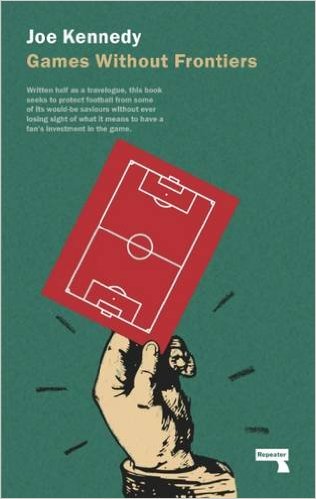 But my top sports book choice as a New Year must-read has to be Games without Frontiers by Joe Kennedy. Not long, but packed into its 132 pages is an analysis and context to help us understand football, sport,and just about everything in-between via political theory and cultural studies and a fine writing style. Read it before January’s out and the rest of the sporting year will I can assure you make a heap more sense.
But my top sports book choice as a New Year must-read has to be Games without Frontiers by Joe Kennedy. Not long, but packed into its 132 pages is an analysis and context to help us understand football, sport,and just about everything in-between via political theory and cultural studies and a fine writing style. Read it before January’s out and the rest of the sporting year will I can assure you make a heap more sense.
Note: No links in this review to Amazon, if you can avoid buying from tax dodgers please do so.
Mark Perryman is the co-founder of the self-styled ‘sporting outfitters of intellectual distinction’ akaPhilosophy Football
'If We Want It' Our 2016 Christmas Message
23.12.16
At Philosophy Football we make the claim 'We don't sell T-shirts.' Instead we are in the business of ideas and ideals printed on to 100% cotton, double-stitched, sizes small-XXL and won't fade or shrink despite numerous spin cycles. Testament to that is the £1580 we raised in 2016 for Hope not Hate in memory of Jo Cox via our Hope not Hate T-shirt while this Christmas we've donated £740 to Cuba Solidarity for Fidel thanks to sales of our Fidel T-shirt plus another £385 for the Hastings Furniture Service helping the homeless settle back into housing via Mark Thomas' Domestic Extremist tee.
In short we create designs not products.We've put some of the best of these from 2016 together with images produced by others we admire and sometimes work with too, added a Louis Armstrong soundtrack and turned it into a non-regal Christmas message you won't have to interrupt the turkey or nut roast to watch. Enjoy, with our seasonal compliments and New Year thanks.
An End to Humbugism
03.12.16
Mark Perryman provides a seasonal round-up of the best books to cheer up the radical spirit
From #chaoticbrexit to the triumph of Trump via the summertime Labour coup. 2016 will be a year to forget for many who cling on to an optimism that a better tomorrow remains not only necessary but possible too. The toxicity of racism , the brutal closure of the Calais refugee camp, the political murder of Jo Cox, the human disaster unfolding in Syria and ever-increasing landmass temperatures signalling the onward march of Climate Change. More than enough to have us all digging into our pockets for the humbugs while giving the holly and the ivy this year a miss. But there’s another side to all of that, for every setback there’s a fightback and in and amongst the mix more than enough to keep at least a semblance of belief in a radically different future. There’s always next year after all.
Britain, across Europe, the USA progressives are now up against a Populist Right, which requires a Populist Left in response. The Populist Explosion by John B. Judis is a richly analytical account of the similarities and differences of what this year emerged as a global phenomenon of racist reaction while Europe in Revolt edited by Catarina Príncipe and Bhaskar Sunkara reveal the resources of hope an insurgent European left provides. For the prospects of ‘what might have been’ read Our Revolution by Bernie Sanders and imagine what a President Trump-free 2017 might have looked like.
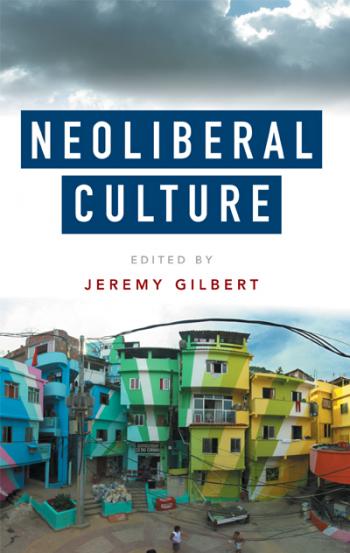 Such an alternative right now however remains at a very low ebb. Books that begin to map out the beginnings of a journey back are needed more than ever. Fortunately 2016 began to provide a good variety of such handy volumes. Now out in paperback Paul Mason’s Postcapitalism remains for many the best of the bunch and for those who don’t have it already a must-have for any Christmas radical reads shopping list. A personal favourite for the combination of design, format and writing is ABCs of Socialism edited by Bhaskar Sunkara. A book to bring the optimist back to earth is The Corruption of Capitalism by Guy Standing, pioneer of the ‘precariat’ analysis, who continues his well-studied research to reveal the transformation of work being effected via the rentier economy. An updated edition of the trailblazing Inventing the Future from Nick Srnicek and Alex Williams provides a manifesto of change to counter the miserable terms and conditions Standing’s ‘precariart’ are forced to endure. But of course these conditions aren’t created simply by the world of work, edited by Jeremy Gilbert Neoliberal Culture provides a much-needed breadth of critique that takes our understanding of the neoliberalism beyond any tendency to cling on to a workerist model of explanation. Taking a similarly broad scope is author Mark Greif, the title of his new book rather gives this away, Against Everything, the perfect seasonal gift for oppositionalists everywhere, not that they will appreciate the gesture, being against such fripperies after all.
Such an alternative right now however remains at a very low ebb. Books that begin to map out the beginnings of a journey back are needed more than ever. Fortunately 2016 began to provide a good variety of such handy volumes. Now out in paperback Paul Mason’s Postcapitalism remains for many the best of the bunch and for those who don’t have it already a must-have for any Christmas radical reads shopping list. A personal favourite for the combination of design, format and writing is ABCs of Socialism edited by Bhaskar Sunkara. A book to bring the optimist back to earth is The Corruption of Capitalism by Guy Standing, pioneer of the ‘precariat’ analysis, who continues his well-studied research to reveal the transformation of work being effected via the rentier economy. An updated edition of the trailblazing Inventing the Future from Nick Srnicek and Alex Williams provides a manifesto of change to counter the miserable terms and conditions Standing’s ‘precariart’ are forced to endure. But of course these conditions aren’t created simply by the world of work, edited by Jeremy Gilbert Neoliberal Culture provides a much-needed breadth of critique that takes our understanding of the neoliberalism beyond any tendency to cling on to a workerist model of explanation. Taking a similarly broad scope is author Mark Greif, the title of his new book rather gives this away, Against Everything, the perfect seasonal gift for oppositionalists everywhere, not that they will appreciate the gesture, being against such fripperies after all.
After that little lot the season of not enough goodwill and too little peace may require a bit of cheer-me-up. The Candidate by Alex Nunns should do precisely that for the convinced Corbynite with an account in riveting detail of Jeremy Corbyn’s rise to power which reads more like a thriller than a chronicle, and that’s a compliment by the way! And for the year ahead those plotting the downfall of Corbyn’s opposition from the Labour Right have the perfect Christmas present in the way of David Osland’s rewrite of the activist classic How to Select or Reselect Your MP. The annual Socialist Register 2017 edition is entitled Rethinking Revolution with a range of fresh thinking on a great theme ranging from Corbynism , the European Left and South Africa’s ANC to radical change in Bolivia plus a range of essays questioning the legacy of 1917’s revolutionary model.
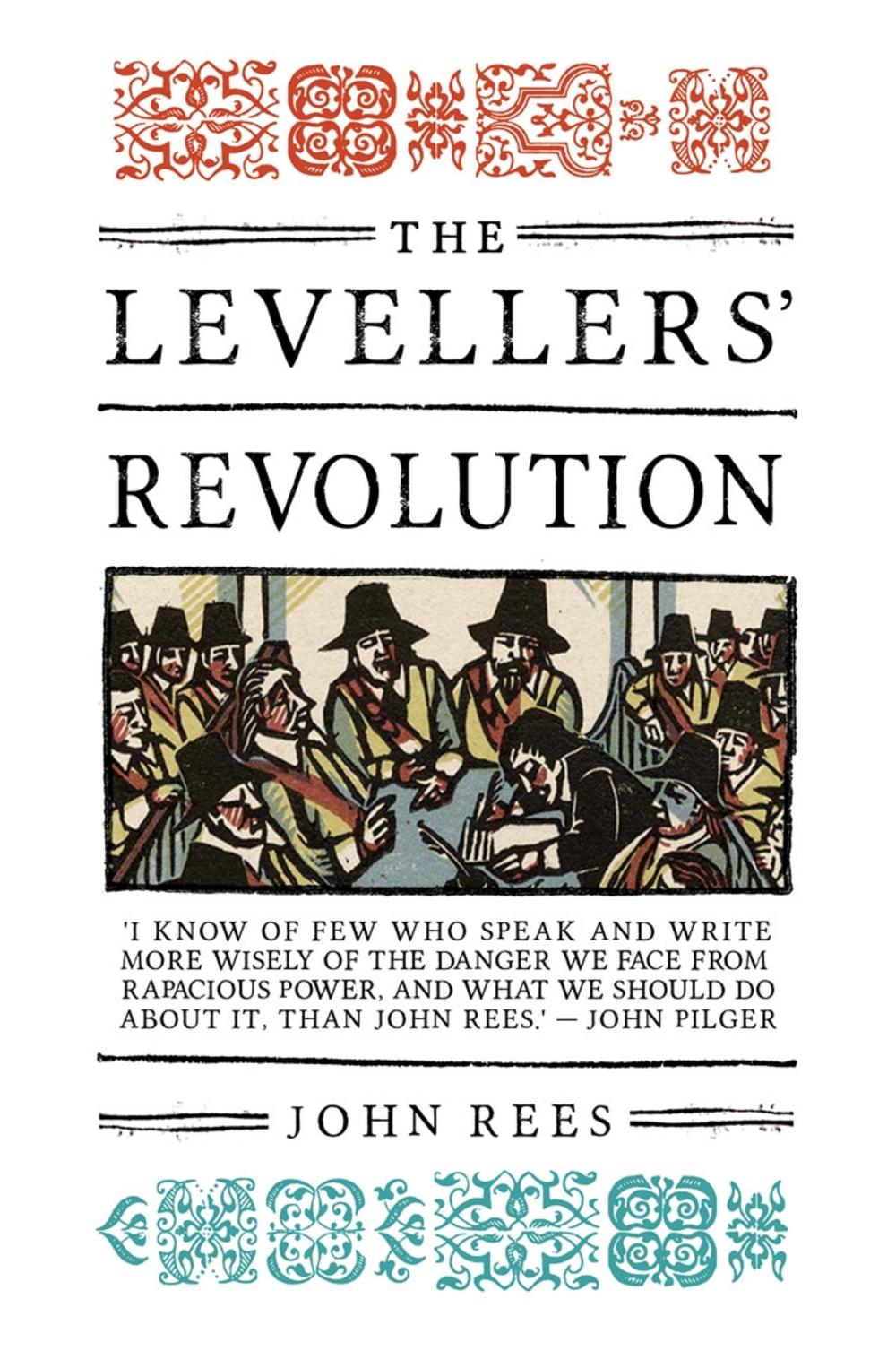 Of course in 2017 there’ll be no escaping the centenary of the Russian Revolution. Get ready to make it a revolutionary New Year with the classic dissident account, Victor Serge’s Year One of the Russian Revolution or for a wholly original approach treat yourself to the brilliant comic-strip style approach of 1917: Russia’s Red Year by Tim Sanders and John Newsinger. Quite the quirkiest account of 1917 I’ve read though, and all the better for it is Catherine Merridale’s incredibly original Lenin on the Train which describes Lenin’s journey to the revolution as a kind of communist version of great rail journeys, superb. The latest edition of my favourite journal Twentieth Century Communismhas a particular interest in communist nostalgia ranging over instances of this perhaps not very quaint phenomenon in Romania, Italy Greece and elsewhere. Without decrying the historical significance of the Russian Revolution there are plenty of other starting points for the revolutionary impulse. The Leveller Revolution from John Rees expertly and passionately describes the tumultuous times of the 1640s English Civil War as one such starting point. Not exactly a year of revolution but one of change nevertheless David Stubbs in 1996 & The End Of History chooses the year of Blur, Oasis, Three Lions and the eve of Blair as PM to entertainingly conclude that those particular twelve months were a kind of start for what became postmodern Britain.
Of course in 2017 there’ll be no escaping the centenary of the Russian Revolution. Get ready to make it a revolutionary New Year with the classic dissident account, Victor Serge’s Year One of the Russian Revolution or for a wholly original approach treat yourself to the brilliant comic-strip style approach of 1917: Russia’s Red Year by Tim Sanders and John Newsinger. Quite the quirkiest account of 1917 I’ve read though, and all the better for it is Catherine Merridale’s incredibly original Lenin on the Train which describes Lenin’s journey to the revolution as a kind of communist version of great rail journeys, superb. The latest edition of my favourite journal Twentieth Century Communismhas a particular interest in communist nostalgia ranging over instances of this perhaps not very quaint phenomenon in Romania, Italy Greece and elsewhere. Without decrying the historical significance of the Russian Revolution there are plenty of other starting points for the revolutionary impulse. The Leveller Revolution from John Rees expertly and passionately describes the tumultuous times of the 1640s English Civil War as one such starting point. Not exactly a year of revolution but one of change nevertheless David Stubbs in 1996 & The End Of History chooses the year of Blur, Oasis, Three Lions and the eve of Blair as PM to entertainingly conclude that those particular twelve months were a kind of start for what became postmodern Britain.
To understand the evolution of an historical tradition of thought and action there’s no better collection than the recently re-issued Antonio Gramsci Reader. This peerless thinker and revolutionary ’s writings 1916-1935 remain the single most important application of 1917 to the world after WWI coinciding with the rise of interwar fascism, moreover they have stood the test of time better than most. A new collection of Eric Hobsbawm’s writings on Latin America Viva La Revolucion is a wonderful way to explore how interpreting the world can enable us to change the world, to kind of misquote Marx. Today such a philosophy, what was once called praxis, finds many different expressions in varied locations and situations. One example is activist-photography on the frontline between the state of Israel and Palestinian resistance which is the subject of Activestills edited by Vered Maimon and Shiraz Grinbaum.
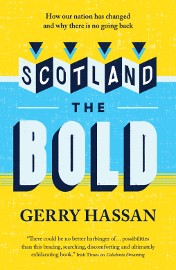 In 2016, as in 2015 and 2014 were too the pivot of radical change on this island remains Scotland. Voted against #ToryBrexit , for a social-democratic and green majority in favour of Scottish independence, led by the most impressive by far of all domestic party leaders. It is no surprise then that writing on Scotland and its politics produces some of the most thoughtful insights either north of, or all points south, of the border. Neil Davidson’s latest collection of richly intellectual essays Nation-States reinforces his reputation as the most creative author currently writing out of the Marxist tradition on the theories and intersections of a nationalist politics. Davidson’s writing combines critical analysis with a grand global overview. Scotland the Bold by Gerry Hassan is focussed more specifically on Scotland yet this liberates rather than restricts Gerry’s radical imaginary which he brilliantly applies to the present and future of this most turbulent of nations.
In 2016, as in 2015 and 2014 were too the pivot of radical change on this island remains Scotland. Voted against #ToryBrexit , for a social-democratic and green majority in favour of Scottish independence, led by the most impressive by far of all domestic party leaders. It is no surprise then that writing on Scotland and its politics produces some of the most thoughtful insights either north of, or all points south, of the border. Neil Davidson’s latest collection of richly intellectual essays Nation-States reinforces his reputation as the most creative author currently writing out of the Marxist tradition on the theories and intersections of a nationalist politics. Davidson’s writing combines critical analysis with a grand global overview. Scotland the Bold by Gerry Hassan is focussed more specifically on Scotland yet this liberates rather than restricts Gerry’s radical imaginary which he brilliantly applies to the present and future of this most turbulent of nations.
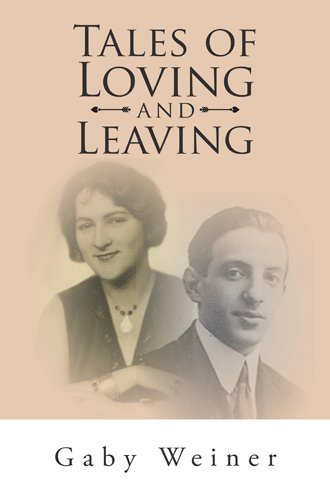 The dark side of versions of nationalism rooted not in liberation but blood and soil are covered in two powerfulyl critical memoirs. Gaby Weiner’s Tales of Loving and Leavingdeserves to become a modern classic. This is a book that expertly yet effortlessly weaves family and generation into two of the most epic events of the Twentieth Century, the Russian Revolution and Hitler coming to power while linking both to a consequence that we continue to live with in the 21st, mass migration. Fascist in the Familyis the kind of title to get the reader to sit up and take notice before they’ve even started thumbing through the pages. Left-wing writer Francis Beckett retells the story of his father, elected as Labour’s youngest MP at the 1924 General Election he became one of Oswald Mosley’s key allies in the British Union of Fascists until he found even this lot not Nazi enough and helped found the National Socialist League. Told with a brutal honesty, a book of horrific tragedy.
The dark side of versions of nationalism rooted not in liberation but blood and soil are covered in two powerfulyl critical memoirs. Gaby Weiner’s Tales of Loving and Leavingdeserves to become a modern classic. This is a book that expertly yet effortlessly weaves family and generation into two of the most epic events of the Twentieth Century, the Russian Revolution and Hitler coming to power while linking both to a consequence that we continue to live with in the 21st, mass migration. Fascist in the Familyis the kind of title to get the reader to sit up and take notice before they’ve even started thumbing through the pages. Left-wing writer Francis Beckett retells the story of his father, elected as Labour’s youngest MP at the 1924 General Election he became one of Oswald Mosley’s key allies in the British Union of Fascists until he found even this lot not Nazi enough and helped found the National Socialist League. Told with a brutal honesty, a book of horrific tragedy.
To add some fiction over the holiday break Andrew Smith’s The Speech . Taking as its starting point the real-life Enoch Powell ‘Rivers of Blood’ tirade Smith engages with themes of culture and community to reveal a fictional plot rooted in reality and hope. Originally published in the wake of Italy’s ‘Hot Autumn’ of 1969 the novel We Want Everything by Nanni Balestrini is both framed by this period of revolutionary youth culture but not trapped by it. As such, this is a novel of enduring inspiration as well as a riveting portrayal of revolt. Europe today is a very different place to ’69 and for a chunk of the British electorate they can’t leave the continent quick enough. Bruno Vincent’s pastiche Enid Blyton story Five on Brexit Island is the near perfect stocking-filler for politicos, remainers or leavers alike.
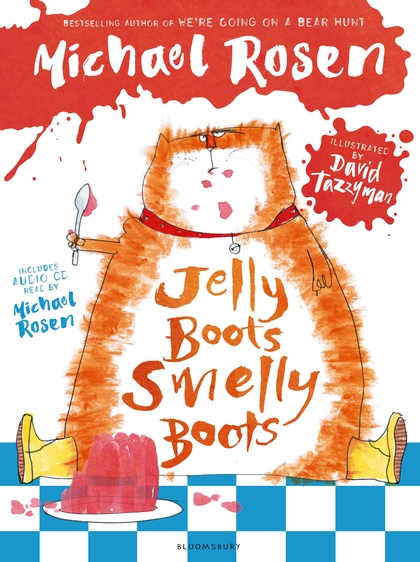 But why should the grown-ups have all the best books? A new Michael Rosen is the highlight of almost any Christmas for younger readers and his latest Jelly Boots, Smelly Boots will do anything but disappoint. Newly translated, An Elephantasy by Argentine children’s author María Elena Walsh combines surrealism and humour via an adventure that is every bit as revealing as it is funny.
But why should the grown-ups have all the best books? A new Michael Rosen is the highlight of almost any Christmas for younger readers and his latest Jelly Boots, Smelly Boots will do anything but disappoint. Newly translated, An Elephantasy by Argentine children’s author María Elena Walsh combines surrealism and humour via an adventure that is every bit as revealing as it is funny.
Even post Bake Off sell-off Christmas is arguably more than almost anything else a culinary event. For those looking to go past the Delias and Jamies three cookery books to expand any chef’s horizons. Ideas to make a break with the traditonal yuletide fare, or simply spice up mealtimes the whole year round, are aplenty in Meera Sodha’s new book Fresh India. Looking beyond Christmas the latest Leon book Happy Salads by Jane Baxter and John Vincent will have any wannabe chef eagerly awaiting Spring to try out the vast range of recipes offered for warmer days. Substantially updated and entirely redesigned the second edition of Laila Ed-Haddad and Maggie Schmitt’s The Gaza Kitchen is internationalism as you eat. History, politics and delicious recipes for those who like to cook up some solidarity.
For agifts to put under the tree for the activist who is anti-consumerist until he, or she, realises that means no pressies we recommend the new edition of Verso’s Book Of Dissent will have ‘em whooping with revolutionary delight not just on the 25th but for the next twelve months too. Or if a different kind of inspiration is required one from Michael Rosen for all from young adults to fully fledged grown-ups, What is Poetry? An easy-to-follow guide to both reading and writing poems, perfect for those with the secret ambition of releasing the inner rhyming couplet. Though our favourite gift is another from Verso, their 2017 Radical Diarydestined to resurrect the annual Big Red Diary that some of a certain political age will remember with fondness. Luxurious design, historical dates and details, quotes, illustrated throughout, it has enough to turn the most dogged pessimist into an optimist for the year ahead.
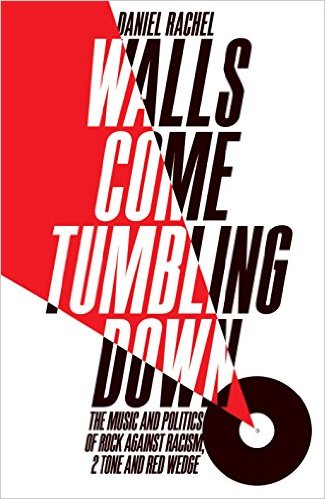 And our book of the seasonal quarter, our number one for Santa’s red list? Well we have two not one because we’ve chosen a theme and there is a pair such outstanding titles it has proved impossible to separate them so we recommend splashing out and getting both. Trump, Farage the #brexit fallout, has seen a revival of a right wing populism built round a naked racism, and with Le Pen 2017 could be worse still. What we desperately need is a popular anti-racism, not talking to each other to confirm our own opinions but to reach out, not pandering to the haters and the misinformed but conversing and where required challenging too. Daniel Rachel’s superb Walls Come Tumbling Down chronicles one such effort, via music, from Rock against Racism via 2-Tone to Red Wedge. A period when pop and politics, including Labour, learned how to work together towards what both understood in different ways as the common good.
And our book of the seasonal quarter, our number one for Santa’s red list? Well we have two not one because we’ve chosen a theme and there is a pair such outstanding titles it has proved impossible to separate them so we recommend splashing out and getting both. Trump, Farage the #brexit fallout, has seen a revival of a right wing populism built round a naked racism, and with Le Pen 2017 could be worse still. What we desperately need is a popular anti-racism, not talking to each other to confirm our own opinions but to reach out, not pandering to the haters and the misinformed but conversing and where required challenging too. Daniel Rachel’s superb Walls Come Tumbling Down chronicles one such effort, via music, from Rock against Racism via 2-Tone to Red Wedge. A period when pop and politics, including Labour, learned how to work together towards what both understood in different ways as the common good. 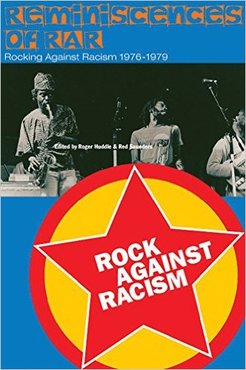 But no such effort would have been remotely possible without the singular experience of Rocking against Racism a story now retold via Reminiscences of RAR edited by two who set it all up, Red Saunders and Roger Huddle. This a book full of such sublime enthusiasm and vision it can only leave the reader wondering why nothing remotely like it has come again and what we can do in 2017 to make that happen. Daniel Rachel’s book will help convince us of the pitfalls of simply recreating the past, Roger and Red’s that despite this when culture and politics click anything is possible. Now that’s one Christmas present worth having.
But no such effort would have been remotely possible without the singular experience of Rocking against Racism a story now retold via Reminiscences of RAR edited by two who set it all up, Red Saunders and Roger Huddle. This a book full of such sublime enthusiasm and vision it can only leave the reader wondering why nothing remotely like it has come again and what we can do in 2017 to make that happen. Daniel Rachel’s book will help convince us of the pitfalls of simply recreating the past, Roger and Red’s that despite this when culture and politics click anything is possible. Now that’s one Christmas present worth having.
Note No links in this review to Amazon, if you can avoid buying from tax dodgers, please do so.
Mark Perryman is the co-founder of the self-styled ‘sporting outfitters of intellectual distinction’ akaPhilosophy Football
We Were Their Flowers in the Dustbin
26.11.2016
40 years ago today The Sex Pistols' Anarchy in the UK was released. Mark Perryman of Philosophy Football remembers.
For some of us of a certain age it still seems like yesterday. For others it is something to breathlessly boast to our children, or grandchildren, that yes, we were there. 26th November 1976, the Sex Pistols release their debut record Anarchy in the UK and for as long as the 7-inch single (remember those?) was on the turntable (ditto) it was as if the world had changed, forever. 
Back in ’76 I was anything but a teenage muso. Whilst others raved about Pink Floyd, Bowie, Fleetwood Mac and the like I remained musically nonplussed. Meantime the teenybop phenomenon of David Cassidy, the Osmonds, the Bay City Rollers were as meaningless to me as their fictional televised version, The Partridge Family. Rock n Roll was growing old minus the disgracefulness bit. And then the Pistols appeared on London Weekend TV. I was about to have supper, my parents were in the kitchen and I was sent to the lounge to switch the television off. It was incredible, a bunch of misbehaving teenagers, the Pistols, Siouxsie Sioux, the Bromley contingent, telling the disbelieving presenter , Bill Grundy, exactly what they thought of him and his hated establishment with every swear word that I knew enough shouldn’t be used in polite company let alone live on ITV. Thankfully my parents hadn’t heard what I’d heard but I had, every bit of it. My mind wasn’t exactly on supper that evening.
Their TV appearance not only catapulted the Sex Pistols into the headlines the musical movement they represented, punk, sparked a moral panic. Of course youth culture had done this before back in the 1950s with the Teddy Boys or the 1960s Mods vs Rockers and most recently early 1970s hippy psychedelia. But by the mid 1970s British politics was in such a state of flux this panic seemed to be of a different order entirely. The miners had been on strike not once, but twice, 1972 and ’74, defeating the Tory government on both occasions. The army were brought in, unsuccessfully, to break both the fire brigades and dustbin workers when they went on strike. They failed. The fascist bootboys of the National Front were on the march and chalking up big votes too, facing fiercely ferocious opposition wherever they appeared. The Police were using ‘Sus’ laws, stop and search, provoking a militant backlash. And the opposition Conservative Party was describing immigration as ‘swamping’ our culture.
The Pistols, with their foul mouths, wilfully out-of-tune music and whining vocals, torn to shreds clothing and safety pins through their earlobes were a two-fingered response to any Establishment attempt to paper over the cracks of this crisis. ‘ We’re the flowers in the dustbin, we’re the poison in your human machine.’ Most if us didn’t know the word at the time but this was a very English nihilism,. ‘Destroy’ as the Pistols’ sang and their T-shirts demanded.
The nihilism wasn’t politically located in any obviously Left v Right sense though the Left liked to think it was because Punks were against the same establishment they were opposed to as well. With the National Front in the shadows there was no guarantee that this propensity to destroy would take a progressive dimension. Not helped either by the Punks’ readiness to wear the swastika as a symbol of the anti-establishment, flirt with Nazi themes in the so-called cause of dissident art and the essential whiteness of the bands and most of their followers. What made this musical moment so special was that not only was any risk of punk’s nihilism becoming a popular force for ugly reaction firmly quashed but an alternative set of connections centred on being both anti-nazi and against racism erected in its place.
This was the unique achievement of late 1970s punk. It became almost indivisible from Rocking against Racism, a movement shortly to be chronicled in a brilliant new book Reminiscences of RAR, and marching against the National Front behind the punked up slogan ‘ Nazis are No Fun.’ Make no mistake the nihilism of punk could have gone either way but it didn’t and a musical movement of change was created, from below, for perhaps the first, and disappointingly to date, the last time. More than any single band or performer The Sex Pistols were emblematic of that moment and the contradictions therein. They ignited the idea that just about anyone could form a band, put on a gig, write and publish a fanzine. Every city, town, village would generate its own version of what Punk was and might become. Rock against Racism fed into this, anybody could join because there was nothing to sign up to, no membership form, no committee, just a movement we made our own. A musical, and political, attitude that matched the needs and aspirations of each other. And without the Pistols none of that would have been possible A bit of eff you with a lot of do-it-yourself. We meant it maaan… and still do !
Mark Perryman is the co-founder of the self-styled 'sporting outfitters of intellectual distinction, aka Philosophy Football. Their range of 40th Anniversary Pistols’ T-shirts are launched today and available from here.
A Poppy for Our Thoughts
11.11.16
Ahead of the England vs Scotland game Mark Perryman responds to FIFA’s Poppies ban
The last time England played Scotland in a competitive match at Hampden Park was also in November, 1999, it was preceded by none of the manufactured row about whether the teams should have poppies embroidered on their shirts. The tabloids were more interested in a good old-fashioned football rivalry instead. The Sun greeting the fixture with the headline ‘Jocks Away’ while north of the border the Daily Recordsought to put England manager Kevin Keegan’ over-confidence in its place ‘Boastbusters’ with the unforgettable tagline ‘ Scots v The Auld Enemy : See Pages 2,3,4,5,6.7,62,63,64,65,66, 67 & 68.’ This was pre Salmond and Sturgeon, the irresistible rise of the SNP and the near wipeout of Scottish Labour MPs. And it was before UKip’s forward march too,. Culminating in #Torybrexit , a populist version of English nationalism against all things that Europe, and Scotland seems to represent in terms of broadly social-democratic values versus a neoliberal free-for-all.
None of this entirely explains the row over the players’ wearing poppies but it does provide a context . It is the same with the emergence of a warped English patriotism that reduces the heroism and sacrifice of those who gave their lives to defend this country in World War Two to just another football chant ‘Two World Wars and One World Cup’ . Scarcely present in ’66 when England were beating West Germany in the final, with the Charlton brothers in the side who had vivid memories of growing up during bombing raids on Tyneside while a decent chunk of England’s support in the stands were of an age who’d fought in that war too. Instead the chants emerged after England’s loss to West Germany on penalties at Italia ’90, cranked up again by the same result to the same opponents at Euro ’96. And all this during an era when euroscepticism led by John Major’s ‘bastards’ opposition on the Tory benches emerged to force a key dividing line in British politics.
This is the context for the current row . An act of remembrance is not of itself political. But who are we rememberjng? What did they fight for ? Where did they come from to join that fight? The clue is in the title of the two conflicts being marked World Wars One and Two. Britain had a special role as combatants in both but we were not alone. The teams of France, Belgium, Holland, Denmark, Norway, or from further field the Commonwealth countries, the USA, USSR are not clamouring to wear a poppy on their shirts this November. When it becomes all about just the home nations while playing internationals the meaning inevitably changes.
FIFA bans all political symbols from adorning any national kits. The Irish are threatened with being punished for embroidering the Easter Rising centenary on to theirs. Almost every FIFA-affiliated country could make a similar case from South Africa and Israel via Armenia and Palestine to Syria and the Ukraine. The Tuesday after England play Scotland they take on Spain in the 80th anniversary year of British and others countries’ volunteers travelling to Spain to join the defence of the Spanish Republic against Franco’s fascists. Is the FA suggesting the England team wear something to mark this special moment of solidarity between our two countries? No, no such suggestion. Some symbols are OK. Others not, a choice made by politics.
We cannot escape the fact that sport is political, it is a contest just like the one on the pitch. Currently in American sport there is a growing movement of athlete-activism . The NFL player Colin Kaepernick kneeling respectfully but defiantly during the playing of the National Anthem because for millions of Americans, despite Trump, #BlackLivesMatter. When USA Women’s Football International, World Cup winner and Olympic Football Gold medallist Megan Rapinoe did the same whilst representing her country she was doing something unheard of over here.
Or maybe not. Gary Lineker has been hounded by the tabloids for his views on refugees not just because for what he is saying, but for who he is and was. A footballer, with views, with politics ? What right does he have to hold such opinions? But of course sport is full of opinions, some of which we agree with others we don’t.
I won’t attempt to predict the England v Scotland score but two things I can be certain of. There won’t be a single Union Jack waved by England fans whereas 50 years ago when England hosted the World Cup the FA managed to get the host country’s flag wrong on all official publicity, the Union Jack not the St George Cross . And there will be plenty of chants inviting the Scots impolitely to stick Nicola Sturgeon somewhere rude. That last time these two teams met in a competitive match, back in '99, I doubt many could have named the SNP leader let alone be much bothered about him.
My beef isn’t with the poppy nor acts of remembrance. The state-sanctioned patriotism serves to obscure the consequences of carnage from the causes of conflict but that is something to contest not retreat from. The argument should be bigger than this annual dust-up over the poppy. It is about breaking down the false division between sport and politics, to recognise that all sport is political, and for those of us with a progressive vision we have a role in shifting those politics on, and off the pitch, from the reactionary to our side, whatever team we support or none.
Mark Perryman is the co-founder of the self-styled ‘sporting outfitters of intellectual distinction’ akaPhilosophy Football from where the 1914 Poppies Remembrance T-shirt is available.
They Did Not Pass
04.10.16
Eighty years ago, 4th October 1936 and Oswald Mosley was preparing to lead a parade of hate. His British Union of Fascists were to march through London's East End home to the Capital's single largest Jewish community. The Blackshirts intent was clear, to spread fear and terror with their vile and violent ant-semitism. Except they didn't. They coudn't because on that day 100,000 Eastenders turned out, of all faiths and none, to stand with their Jewish neighbours and at Cable Street first they stopped the Fascists and then forced them into humiliating retreat. They did not pass.
For the anniversary Philosophy Football's specially-made short film combines archive images soueced by David Rosenberg author of Rebel Footprints : Uncovering London's Radical HIstory with a Heaven 17 soundtrack of We Don't Need That Fascist Groove Thang. In music and pictures against fascism then,now and forever.
 The Philosophy Football 80th anniversary Cable Street T-shirt is available from here
The Philosophy Football 80th anniversary Cable Street T-shirt is available from here
Our Front is Popular
15.09.2016
Mark Perryman revisits 1936 when anti-fascism was the cause home and abroad
‘ Hurrah for the Blackshirts!’ The notorious Daily Mail headline is just one chilling indication of the very real threat Oswald Mosley’s British Union of Fascists posed in the mid 1930s. Inspired by the successful rise to power of Mussolini in Italy and Hitler in Germany Mosley sought to galvanise support via a combination of naked anti-semitism and brute force. By 1936 he was attracting both well-heeled establishment support and thousands to his rallies where any protests would be dealt with violently and without scarcely any intervention by the police.
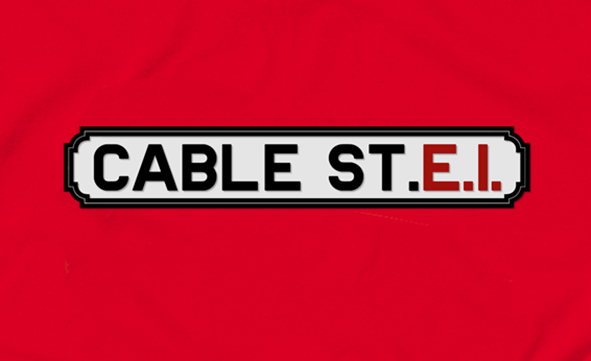 On 4th October 1936 Mosley planned the BUF’s biggest and boldest initiative yet. His uniformed Blackshirts would march through London’s East End, home to one of the country’s largest Jewish communities. The intention was quite clear, to cause fear and stir up hate. On the day more than a hundred thousand East Enders turned out to protect their community, of whatever faith or none. The fascists were forced to retreat. They did not pass. But there was also a realisation that protest alone would not stop the hateful ideas that Mosley sought to encourage as a vicious diversion from the causes of the East End’s very real problems. Phil Piratin, one of the key organisers of the Cable Street protest, argued successfully that the key to the area’s problems was poor housing, slum landlords, steep rent rises and evictions. He helped organise tenants, including those with BUF sympathies, separating the cause of their living conditions from the lies the fascists spread. Piratin was a Communist, in the 1945 General Election just nine years after the Fascists thought they could rule the East End he was elected the Communist MP for Stepney.
On 4th October 1936 Mosley planned the BUF’s biggest and boldest initiative yet. His uniformed Blackshirts would march through London’s East End, home to one of the country’s largest Jewish communities. The intention was quite clear, to cause fear and stir up hate. On the day more than a hundred thousand East Enders turned out to protect their community, of whatever faith or none. The fascists were forced to retreat. They did not pass. But there was also a realisation that protest alone would not stop the hateful ideas that Mosley sought to encourage as a vicious diversion from the causes of the East End’s very real problems. Phil Piratin, one of the key organisers of the Cable Street protest, argued successfully that the key to the area’s problems was poor housing, slum landlords, steep rent rises and evictions. He helped organise tenants, including those with BUF sympathies, separating the cause of their living conditions from the lies the fascists spread. Piratin was a Communist, in the 1945 General Election just nine years after the Fascists thought they could rule the East End he was elected the Communist MP for Stepney.
Within weeks of Cable Street the Spanish Civil War that had begun in July with Franco’s armed rebellion against the democratically elected Republican Government led to the formation of the International Brigades. Travelling to Spain, mostly with next-to-no military training, British volunteers went there to join the country’s battle for land and freedom against Franco’s fascism. An internationalism which was criminalised by their own government which backed instead a useless policy of non-intervention while Hitler and Mussolini armed unimpeded their Spanish ally Franco. Preceding the International Brigades foreign volunteers simply formed units to help defend the Republic, amongst the first was the Tom Mann Centuria made up of Brits living and working in Barcelona. Once the British Battalion was officially formed it joined the 15th Brigade which was primarily, though not exclusively, English-speaking. The fighting Spanish forces included Catalan nationalists , anarchists and anarcho-syndicalists and parties such as the POUM which George Orwell famously fought alongside. All were united however, for the most part, in what was known as a ‘Popular Front’ led by socialists and communists.
In 1938 the International Brigades left Spain and within less than a year Franco had completed his victory, a fascist regime installed in Spain. Shortly after Hitler invaded Poland, World War Two began. On the Brigade’s departure the Communist MP Dolores Ibárruri, known forever as La Pasionaria, spoke, her words remain an inspiration for all those who resist oppression, wherever, whatever, whenever.
“It is better to die on your feet than live on your knees."
The Popular Front which inspired both those who stopped the Blackshirts at Cable Street and those who joined the International Brigades was based on a simple idea. Concentric circles of unity. At its centre was the working-class movement, in the 1930s this was most notably the Communists, around which was formed a broader anti-fascist People’s Front. And by World War Two this became a National-Popular Front in those countries determined to resist Hitler, Mussolini and Imperial Japan, eventually with the USSR’s entry into the war in 1941 this took on the dimension of an International Front too.
Two of the key objectives of the Popular Front were outlined by the architect of the strategy, Bulgarian Communist Georgi Dimitrov.
“ Find a common language with the broadest masses as well as overcoming the fatal isolation of the working class itself from its natural allies.”
Eighty years on in a much-changed era for a radical politics of opposition they are principles that nevertheless remain as relevant as ever for all those committed to rebuilding a Popular Left.
Mark Perryman is the co-founder of the self-styled ‘sporting outfitters of intellectual distinction’ aka Philosophy Football. Our range of 1936 Popular Front T-shirts is available from here.
Social-democratic Team GB success vs Freemarket England Football Team Failure
22.08.2016
Mark Perryman outlines what Team GB's Olympic success does and does not mean
Team GB’s second place in the Rio medals table is nothing less than staggering. It is only 20 years ago that the squad returned with a solitary Gold from Atlanta ’96 clinging on to 36th in the table..This sporting nation is now ranked alongside the Olympian superpowers of USA and China. If it hadn’t been for the partial IOC ban on their competitors Russia would have been in the mix too but still this remains a remarkable Team GB medal haul.
Unlike the football World Cup the Olympics Medal Table is by and large an indicator of global economic and political power. These superpower natiions, USA, China and Russia, cannot claim a single men’s Football World Cup title between them or have come anywhere but close, mostly. The Olympics is different. So how has Team GB ended up on top of the Olympic pile?
20 years ago apart from Atlanta '96 there was Euro '96. England's last semi-final appearance at a tournament, Scotland went out at the Group Stage and apart from France '98 have failed to qualify since. Wales and Northern Ireland each had magnificent France 2016 campaigns this summer but apart from that the record has been pretty dismal. For England and a sport which, despite all the evidence, we like to think we rule the world the contrast with Team GB's recovery over those same two decades is startling.
 The reasons are not so much in further, faster, higher than a victory of social-democracy vs neoliberalism. Yes that’s right. Via the Lottery all the most successful Team GB Olympic sports are state –subsidised. A huge investment, £350 million over the Olympic Cycle, or around £5.5 million per Medal won. But the values of social democracy that pervade this sporting success go further. The funding is subject to regulatory governance, of collective endeavour and accountability. The Olympic Sports entirely control the regime their athletes train and compete under with a relentless pursuit of Olympic success as the pinnacle of all achievement, if necessary at the cost of other competitions and honours.
The reasons are not so much in further, faster, higher than a victory of social-democracy vs neoliberalism. Yes that’s right. Via the Lottery all the most successful Team GB Olympic sports are state –subsidised. A huge investment, £350 million over the Olympic Cycle, or around £5.5 million per Medal won. But the values of social democracy that pervade this sporting success go further. The funding is subject to regulatory governance, of collective endeavour and accountability. The Olympic Sports entirely control the regime their athletes train and compete under with a relentless pursuit of Olympic success as the pinnacle of all achievement, if necessary at the cost of other competitions and honours.
English football represents the total opposite. Here neoliberalism rules. Far more money is splashed about. £350 million? That wouldn’t be far off just one Premier League club’s transfer and wages budget for a single season. For what? The ‘best league in the world’ (sic) is going backwards in terms of mounting a serious challenge to win the Champions’ League. And as the recent Euro 2016 Final proved the finest players in Europe, and this was also true of the World Cup 2014 Final too, the world as well, by and large play outside of England too. In classic neoliberal fashion the ‘richest league’ in the world has been wilfully mistranslated in to the ‘best league’ in the world.
But the biggest marker of this failure is the England football team. All the riches in the world and they cannot get past Iceland, or at World Cup 2014 out of their group. The sport’s governing body, the FA, has engineered the total deregulation of their own sport. Every club out for their own end. Private money chasing individual gain, no collective endeavour, zero accountability, hands-off governance The result is a catalogue of failure.
No Olympic sport would permit such an abdication of responsibility and thus the big result from Rio can’t simply be measured in the mountain of Gold, Silver and Bronze medals but eam GB’s social democratic values beating the freemarket failure of English football hands down.
However the social-democratisation of Team GB is flawed in one crucial respect. The £350 million bill has given those that enjoy their sport from the sofa a glorious two and a bit weeks. A quadrennial celebration of sport few will forget in a hurry. But while there will be a spike of interest in doing some of these sports without the infrastructure and funding to meet the largesse splashed out on the elite level this will be short-lived. This isn’t to decry the Gold Medals. But we need a political conversation – this is about political choices – that makes the connection between a social democratic sports culture for some with one that is for all. To recognise that while TV viewing figures soar, the front page celebrations of Olympic success become a daily occurrence and the Gold Medal feelgood factor hits the heights none of this is enough to sustain a fundamental change in sport and leisure culture.
Team GB has helped prove what an impact public expenditure combined wity regulation towards a collective end can achieve. And precious few complain, we wallow in the success as much theirs, the athletes', as ours' too. But this race won’t truly be won until those resources are mobilised towards creating a sports and leisure culture that serves sport for all, and not just for some. If public expenditure is good enough to fund winning Gold Medals then isn’t it good enough to fund the return of school playing fields, build public swimming pools, construct jogging and exercise trails too.
Philosophy Football's unique, strictly unofficial, Team GB Rio Medals Table T-shirt is available from here
Mark Perryman, co-founder of the self-styled ‘sporting outfitters of intellectual distinction, aka Philosophy Football, and author of Why The Olympics Aren’t Good For Us : And How They Can Be.
- And then there were two
01.03.25 - This Land is (still) Your Land
22.02.25 - Happy 80th Birthday Bob Marley
01.02.25
